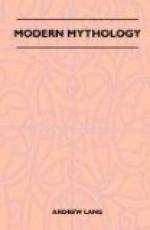’We have here a good opportunity of comparing the interpretations put forward by those who think that a study of the myths and customs of uncivilised tribes can help us towards an understanding of Greek deities, and the views advocated by classical scholars {138} who draw their information, first of all, from Greek sources, and afterwards only from a comparison of the myths and customs of cognate races, more particularly from what is preserved to us in ancient Vedic literature, before they plunge into the whirlpool of ill-defined and unintelligible Kafir folklore. The former undertake to explain Artemis by showing us the progress of human intelligence from the coarsest spontaneous and primitive ideas to the most beautiful and brilliant conception of poets and sculptors. They point out traces of hideous cruelties amounting almost to cannibalism, and of a savage cult of beasts in the earlier history of the goddess, who was celebrated by dances of young girls disguised as bears or imitating the movements of bears, &c. She was represented as [Greek], and this idea, we are told, was borrowed from the East, which is a large term. We are told that her most ancient history is to be studied in Arkadia, where we can see the goddess still closely connected with the worship of animals, a characteristic feature of the lowest stage of religious worship among the lowest races of mankind. We are then told the old story of Lykaon, the King of Arkadia, who had a beautiful daughter called Kallisto. As Zeus fell in love with her, Hera from jealousy changed her into a bear, and Artemis killed her with one of her arrows. Her child, however, was saved by Hermes, at the command of Zeus; and while Kallisto was changed to the constellation of the Ursa, her son Arkas became the ancestor of the Arkadians. Here, we are told, we have a clear instance of men being the descendants of animals, and of women being changed into wild beasts and stars—beliefs well known among the Cahrocs and the Kamilarois.’
* * * * *
Here I recognise Mr. Max Muller’s version of my remarks on Artemis. {139a} Our author has just remarked in a footnote that Schwartz ’does not mention the title of the book where his evidence has been given.’ It is an inconvenient practice, but with Mr. Max Muller this reticence is by no means unusual. He ’does not mention the book where ’my ’evidence is given.’
Anthropologists are here (unless I am mistaken) contrasted with ’classical scholars who draw their information, first of all, from Greek sources.’ I need not assure anyone who has looked into my imperfect works that I also drew my information about Artemis ’first of all from Greek sources,’ in the original. Many of these sources, to the best of my knowledge, are not translated: one, Homer, I have translated myself, with Professor Butcher and Messrs. Leaf and Myers, my old friends.




